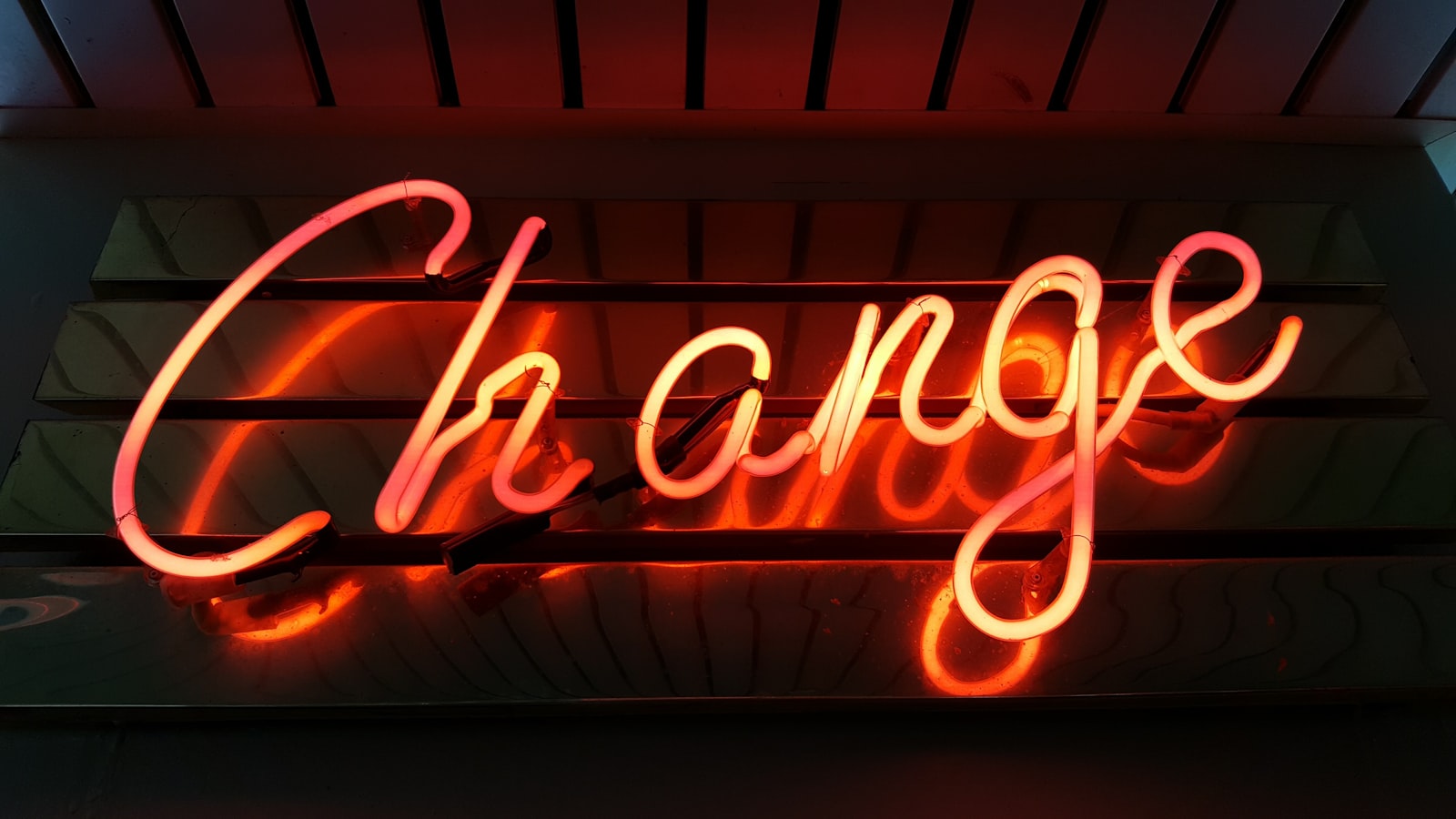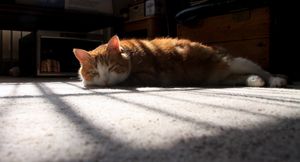Yes, this is an excuse to listen to this song.
This has been an interesting late winter and spring for me, capped off by the Leafs deciding to make some ch-ch-changes. You'll be shocked to hear that's something I've been thinking about a lot lately.
My overarching lesson on the big change in the PPP part of my life was that when change is thrust upon you, that's the time to examine all your assumptions, to really question everything and make sure that what you build anew is what you want to build, not a replica of the old because that's what you're comfortable with.
"Everyone hates change," is a ... well, I'm just going to coin the term falsism for something that is largely bullshit, but is occasionally true. I think change makes people uncomfortable because it layers the unknown on top of all the other disruption and leads to fear and anxiety. But change is an inevitable part of life and discomfort is often necessary. You don't get to stay a kid forever, but Bowie is here to remind us you don't have to grow up to a formula designed by someone else, either.
To put this in Leafs terms: Did Shanahan make the right decisions when he decided to thrust change upon the team?
There's only one answer and it's: Who the hell knows, eh? Time will tell and we can't trace time.
Is Brad Treliving going to turn the team away from "facing the strange?" Is he really here to make the team grow out of it? I know many people want that, and I can't overstate the depth to which it chafes to hear people around here talk about the Maple Leafs players like they imagine themselves as a drill sergeant in a bad 80s movie whipping those ungrateful brats into shape. What an absolute load of crap. But the other extreme, where the players are meant to be free spirits and cre8tive, just going with how the mood moves them with no one ever telling them what to do sounds like the Leafs are the team the Montessori School sponsors in the local "no score" hockey league. Somewhere in the middle is where reality will lie.
Instead of guessing the future, trying to predict exactly what Treliving will do, which is basically all we do in June, July and August around here, how about a break where we think about the past, question the way things have always been done and ask where else there should be changes.
Just one thing first. I'm not one to explain myself, but this issue has become so pervasive on this blog and in the world in general, it has to be laid out: Criticism of someone is not the same as total hatred of that person in all ways and for all time. Praise of someone is not the same as total and unstinting loyalty in all things. Partisanship, side-taking, whatever you call it is very, very often in the head of the reader. You are seeing someone say Kyle Dubas was wrong about thing X and now that person is a hater. If they say Kyle Dubas was right about something, they're a Dubas fan. You're making this up.
You don't actually have to pick a side here. Everyone involved in running the Leafs has strengths and weaknesses, good points and bad. If you want want White Hat/Black Hat simple stories, maybe go watch a movie instead of something involving real people. Or rewatch Game of Thrones and see if you learn the lesson it teaches about Team Pretty Blonde Girl.
Now, onto the looking back as objectively as possible.
The Marlies
If you focus only on the Leafs (this is fine, no one is being tested on their AHL knowledge here) you might have missed the firing of the entire Marlies coaching staff. It was overdue by a couple of years.
Back when Lou Lamoriello ran the Leafs, Kyle Dubas was in charge of the Marlies. He hired Sheldon Keefe as coach and added A.J. MacLean (son of former Leafs assistant and advisor Paul MacLean), and you'll never guess where he worked before. Rob Davison was the other assistant, replacing Gord Dineen. Davison had worked in the KHL one year and two in the EBEL before the Marlies job.
Keefe was replaced on his promotion to the Leafs with Greg Moore – a pair of moves that was clearly ready and waiting for an excuse to fire Mike Babcock to present itself.
Davison left and John Snowden, formerly the coach in Newfoundland, joined the team. He'd never been anywhere but the ECHL prior to that job. Moore had been the coach of Chicago Steel, the USHL team that the Leafs under Dubas had a close relationship with. When Leafs AGM Laurence Gilman went to a farm upstate, Ryan Hardy, GM of Chicago Steel, was hired to be the GM of the Leafs' minor league teams and ultimately became an AGM of the parent team – as is tradition for the guy running the AHL team. He'd never held a job outside junior or NCAA hockey other than two years as a scout for the Bruins.
So there we are. The Marlies were gradually populated by "bros Kyle knows" with a full suite of people – who might be extremely talented, don't get me wrong – who had no experience at the AHL level at all. Not one of them became promotable to the NHL out of their years in the Leafs farm system, and now at the crisis point, with Spencer Carbery gone off to become a head coach, and the future of Sheldon Keefe in flux, there is nothing down on the farm to bring up – not even as the lowliest assistant.
Is Greg Hardy even going to last beyond the end of June? Should he, is the better question. To be fair to everyone here, the pandemic was not kind to the AHL. Teams lost seasons, parts of seasons, and spent one and a half seasons coping with the existence of the Taxi Squad which just meant AHL players who sit around. The teams were trimmed bare, and the success or failure relied on finding good players on AHL contracts to flesh out the team. The Marlies did fairly well, and the Growlers are the gold standard of how to have a contender by filling it with ringers who could be playing in the league above them.
Once the pandemic was over (in the hockey sense), the Marlies were a borderline playoff team that turned a hot run this year into a good spot in the standings that didn't get them far in the playoffs.
Getting back to the theme of examining assumptions: The underlying ethos of Dubas's minor league system was an aspirational baseball-style three-tiered setup that costs a lot of money and requires oversight and scouting resources to keep it staffed and full of players. I think it's much ado about nothing. I always have. I don't believe in the ECHL to NHL pipeline, and I don't think it matters.
Imagine you're playing a video game and one of the things you do in the game is mine for sparkly gems. You mine, you mine, you mine, you mine and once in a very precise number buried in the game code, you get a gem. Or you can go to the NPC in town and buy it with the gold you get doing all the other fun things in the game.
The mining has to have value for its own sake to be worth not just skipping over it and buying your gems. And I have always questioned if there is any genuine gain to Dubas's souped-up minor system beyond making the place the extra goalie gets some starts into a better team. The players mined out of the ECHL to AHL and the AHL to NHL (so not drafted prospects) are great guys – I like Bobby McMann fine. But you can go to town and buy a Bobby McMann any time you need one (Just ask Vegas).
Between filling the Marlies staff with people, as likely as not to be great people, who were developing away like they were in a Silicon Valley Incubator project and the entire convoluted and intensely expensive systems – was there any real practical point to all of this theory made manifest? Just like with the players, you can't have just prospects on your staff who might be useful at the top level someday, but not now. It's time to refocus the minor leagues and start having coaches who are the kind that get talked about when NHL jobs come up instead of inspiring everyone to ask "Chicago Steel or the Soo?"
Now is very much the time, since drafted prospects are hitting the Marlies in numbers, and they really are the reason the AHL team exists. The team needs to be an environment conducive to development. There are stories aplenty about AHL teams run badly and ruining prospects. But the Marlies don't need to be run like a mini-NHL team with massive scouting resources spent on finding another McMann or Brandon Lisowsky because once in a blue moon you find Mason Marchment. The Marlies need to be focused on the players who can now or may in the future move to the NHL.
Dubas's staff has already built out a larger development system than most teams have, and that's good, but the coaching needs to be serious, professional, and nipping at the heels of the guy behind the Leafs bench.
Hockey Ops
Looking over the very, very bloated org chart that Kyle Dubas created over the last two seasons, it might be time to rip some brass plaques off of some doors. The Leafs have (remember the list we see publicly is mostly just management level people):
- 4 AGMs (not counting Laurence Gilman who is listed only on the Marlies org chart or Shane Doan)
- 10 Directors or Senior Directors of various departments
- 7 members of the coaching staff still on board after the departure of Carbery
- 11 player development staff
The Marlies, btw, are governed by Gilman, Ryan Hardy and also one of the Directors listed on the Leafs page. Three senior managers for one AHL team that just had to fire all the coaches.
Back in the early days of Keefe's tenure as a coach, when he was the white hat to Mike Babcock's black hat and could do no wrong, he ran a practice with music blaring and groups of staff on the ice with the players and it looked, in all the videos people gushed over, like pandemonium. I get that vibe from the sheer volume of managerial staff the Leafs now have. Title proliferation is usually what you see in companies too cheap to pay people bonuses. Brass instead of more money. Whatever the point was for the Leafs – mining for nuggets of wisdom in all that noise, it got out of control when it topped 100 names on the page. Some teams put up photos on their staff pages, but the Leafs can't do that or the page would never load.
I won't be surprised if names get changed, but also the total number of top management gets cut.
Scouting
There's only six pro scouts on the Leafs staff list, and a host of amateur scouts all over the world. The Leafs scout every league for the draft, but also for European free agents to sign. This is a good thing, a valuable use of their resources, but a rethink and a retooling is in order.
The reason the European scouting needs to change is the decline and fall of Russia and the KHL. The KHL is almost entirely devoid of foreign players beyond some misguided Canadians, and it is going to stay a pariah league for years. There is no magic reconciliation on the horizon, no reset back to normal.
The KHL was very useful to NHL scouts because it was a truly international league with an average strength at or above the AHL, and with many teams that were far superior to AHL teams. It was the place to find players who bridged that gap from AHL star to NHL player – many of them not Russians. But the store is now closed.
No one league has taken over, but the Swiss league is trending in the right direction. Scouting of European hockey must change, and a lot of the players who used to go to the KHL have gone elsewhere – some even to the AHL. The Leafs can't just be "we've always done it this way" with their scouting. They need to look at different parts of Europe, and they need to focus on the AHL and NHL scouting for trades and free agent signings a lot more.
Coaching Staff
It seems like a very natural time to examine the NHL-level coaching staff. My first question is this: What's going on with the assistants?
Sheldon Keefe's assistants:
- 2019-2020 - Andrew Brewer, Dave Hakstol and Paul McFarland
- 2020-2021 - Dave Hakstol, Paul MacLean, Manny Malhotra
- 2021-2022 - Spencer Carbery, Dean Chynoweth, Manny Malhotra
- 2022-2023 - Spencer Carbery, Dean Chynoweth, Manny Malhotra
One season out of four where there were no changes. And at the end of that process, Carbery, the highly sought after head coaching candidate, is gone and Sheldon Keefe may remain. The argument for keeping him is that there is no replacement in-house. Or out of the house either, plus he's still under contract.
This time of changes should be when the two remaining names – as well as the other non-bench coaches – are all looked at and hard questions asked about their futures. Are they at their ceiling? Is there another Carbery in there to be sent off to another team because of the contractual commitment to Keefe?
A cynic might see this situation where Leafs coaches below Keefe only moved up on two occasions – Hakstol and Carbery – as a way of insulating Keefe from any pressure on his status by filling jobs with rookies to develop. The why doesn't really matter, the result is that the Leafs are in the market for an entire AHL staff at a time when other AHL teams are already sorting that out, and they also need at least one high-quality assistant coach who can build a power play for some of the most highly skilled forwards in the game. A power play that must work – no room for rookie mistakes.
Calgary
Brad Treliving can't just build another Flames. Not that I'm saying he'd want to, but he needs to also question the assumptions he had in his last job. The Leafs have more money, a lot more. And it should be spent, wisely for sure, but unstintingly on the things that will help the team succeed.
It's possible that Calgary's staff was too small, too stretched, that they didn't scout enough or have enough of a data management and evaluation staff. Meanwhile, Kyle Dubas was going all over the map bringing in consultants and creating roles for a diverse group of people – everyone from a wellness practitioner to a motivational speaker from the traditions of the Black Church. I think the focus needs to be pulled in, but not so tight it becomes a closed shop where new ideas can't get in.
It's been said before that if Lou Lamoriello was an extreme of one type, and Kyle Dubas the other, that Brad Treliving is in the middle. There's a danger of being in the middle of never truly committing to anything. Treliving needs to figure out his path between the two extremes, and commit to his own version of the Leafs. It's not an easy task, and it is far, far too easy to fall into the trap of the familiar, the bro you know (cough), the people you trust, the way you've always done it.
Bowie's Changes, which is about reinvention, ageing, finding your identity and a little bit about generational conflict, was written in 1971 when Brad Treliving was two years old and almost everyone was alive when the Leafs last won the cup. None of this is new, but letting go of the familiar and the traditional is not something most people find easy to do. After all, Kyle Dubas is still hated by many because he's not exactly like every GM who came before him.



